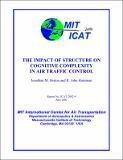The Impact of Structure on Cognitive Complexity in Air Traffic Control
Author(s)
Histon, Jonathan
DownloadICAT-2002-4.pdf (2.668Mb)
Metadata
Show full item recordAbstract
Focused interviews with air traffic controllers and traffic management unit personnel, as well as analysis of traffic flow patterns based on Enhanced Traffic Management System (ETMS) data, suggest that controllers rely on underlying airspace structure to reduce the cognitive complexity of managing an air traffic control situation. To understand how structural elements reduce cognitive complexity, a framework has been developed relating structure, situation awareness, and a controller’s working mental model. It is hypothesized that structure forms the basis for abstractions which simplify a controller’s working mental model. The working mental model is used to support the key tasks of a controller identified by Pawlak (1996): planning, implementing, monitoring, and evaluating. Three examples of structure-based abstractions have been identified: standard flows, groupings, and critical points.
Date issued
2002-06Series/Report no.
ICAT-2002-4
Keywords
air traffic controllers, management, air transportation